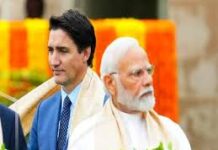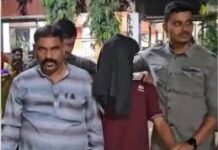A day after India described Pakistan as “terroristan” and “land of pure terror”, External Affairs Minister Sushma Swaraj launched a withering attack on its western neighbour, saying that while India created IITs, IIMs and AIIMS, Pakistan had produced Lashkar-e-Taiba, Jaish-e-Mohammad, Haqqani Network and Hizbul Mujahideen.
Swaraj put terrorism emanating from Pakistan at the front and centre of her speech to the 72nd session of the United Nations General Assembly on Saturday — it overshadowed all other themes, and occupied the major portion of her speech. She mentioned Pakistan 15 times, and terror or terrorism 17 times. Last year, she had mentioned Pakistan six times, and terror or terrorism 18 times.
Unlike last year, she made no mention of Balochistan and Pakistani human rights violations. “We (India) produced scholars, doctors, engineers. What have you produced? You have produced terrorists,” Swaraj said in her speech in Hindi. “Doctors save people from death; terrorists send them to death… We produced IITs, IIMs, AIIMS and space reserach centre, you produced Lashkar-e-Taiba, Jaish-e-Mohammad, Haqqani Network and Hizbul Mujahideen.”
Minutes after her speech, Prime Minister Narendra Modi tweeted:
Incredible speech by EAM @SushmaSwaraj at the @UN! She has made India extremely proud at the world stage. https://t.co/nLI2CC2VBj #UNGA
— Narendra Modi (@narendramodi) September 23, 2017
EAM @SushmaSwaraj was insightful in identifying global challenges & strongly reiterated India's commitment to create a better planet. #UNGA
— Narendra Modi (@narendramodi) September 23, 2017
A strong message was given by @SushmaSwaraj Ji on the dangers of terrorism and why we have to unite and fight this menace. #UNGA
— Narendra Modi (@narendramodi) September 23, 2017
In a speech punctuated by applause, Swaraj said, “I would like today to tell Pakistan’s politicians just this much, that perhaps the wisest thing they could do is to look within. India and Pakistan became free within hours of each other. Why is it that today India is a recognised IT superpower in the world, and Pakistan is recognised only as the preeminent export factory for terror?”
India, she said, had “risen despite being the principal destination of Pakistan’s nefarious export of terrorism”. She asked what Pakistan had offered “to the world and indeed to its own people” apart from terrorism, and said if only Pakistan had spent on its development what it has spent on developing terror, “both Pakistan and the world would be safer and better off today”.
Swaraj tore into Pakistan’s Prime Minister Shahid Khaqan Abbasi, who had, in his speech on Thursday, levelled accusations against India. “We are completely engaged in fighting poverty; alas, our neighbour Pakistan seems only engaged in fighting us,” she said. “On Thursday, from this dais, Pakistan’s prime minister wasted rather too much of his speech in making accusations against us. He accused India of state-sponsored terrorism, and of violating human rights. Those listening had only one observation: “Look who’s talking!” A country that has been the world’s greatest exporter of havoc, death and inhumanity became a champion of hypocrisy by preaching about humanity from this podium.”
Abbasi, Swaraj said, had recalled “old resolutions” that have long been overtaken by events. “But his memory has conveniently failed him… He has forgotten that under the Shimla Agreement and the Lahore Declaration, India and Pakistan resolved that they would settle all outstanding issues bilaterally. The reality is that Pakistan’s politicians remember everything, manipulate memory into a convenience. They are masters at “forgetting” facts that destroy their version,” she said.
“Pakistan’s current prime minister spoke of a “Comprehensive Dialogue” between our two countries. I would like to remind him that on 9 December 2015, when I was in Islamabad for the Heart of Asia conference, a decision was made by his leader Mian Nawaz Sharif, then still prime minister, that dialogue between us should be renewed and named it a “Comprehensive Bilateral Dialogue”. The word “bilateral” was used consciously to remove any confusion or doubt about the fact that the proposed talks would be between our two nations and only between our two nations, without any third party present. And he must answer why that proposal withered, because Pakistan is responsible for the aborting that peace process.” This was a response to Pakistan seeking UN intervention on Kashmir.
Terrorism is at the “very top of problems” for which the UN is seeking solutions, Swaraj said, adding that India had been among its oldest victims. “When we began articulating about this menace, many of the world’s big powers dismissed this as a law and order issue. Now they know better. The question is: what do we do about it? “We must all introspect and ask ourselves whether our talk is anywhere close to the action we take. We all condemn this evil, and piously resolve to fight it in all our declaratory statements. The truth is that these have become rituals. The fact is that when we are required to fight and destroy this enemy, the self-interest of some leads them towards duplicity. This has been going on for years.”
India had proposed a Comprehensive Convention on International Terrorism (CCIT) as early as in 1996, Swaraj said — but more than two decades later, the UN had been unable to agree upon a definition of terrorism.
“If we cannot agree to define our enemy, how can we fight together? If we continue to differentiate between good terrorists and bad terrorists, how can we fight together? If even the United Nations Security Council cannot agree on the listing of terrorists, how can we fight together?” she said, indicating China’s blocking of listing of terrorists like JeM chief Maulana Masood Azhar.
She urged nations to stop seeing this “evil with self-defeating and, indeed, meaningless nuance”. “Evil is evil. Let us accept that terrorism is an existentialist danger to humankind. There is absolutely no justification for this barbaric violence. Let us display our new commitment by reaching agreement on the Comprehensive Convention on International Terrorism this year itself,” she said.
Swaraj also touched upon climate change, a challenge she said required more “serious action than talk”. “Nature sent its warning to the world even before the world’s leadership gathered in New York… through (Hurricane) Harvey,” she said. “We must understand, this requires more serious action than talk. The developed world must listen more carefully than others, because it has more capacities than others. It must help the less fortunate through technology transfer and Green Climate Financing — that is the only way to save future generations.”
India, Swaraj said, “has already said that it is deeply committed to the Paris Accord. This is not because we are afraid of any power, influenced by friend or foe, or tempted by some imagined greed”. After the speech, Modi tweeted, “EAM @SushmaSwaraj was insightful in identifying global challenges & strongly reiterated India’s commitment to create a better planet.”
Swaraj also praised Modi’s decision to demonetise high-value currency notes last November. “Demonetisation was a courageous decision to challenge one of the byproducts of corruption, the ‘black money’ that disappeared from circulation,” Swaraj said. On the UNSC reforms, she said: “Efforts at text-based negotiations on the reform and expansion of the Security Council were initiated in the last session and more than 160 nations had expressed support for this effort. If we are serious, then the least we can do is produce one text that can be the basis for negotiation.”















